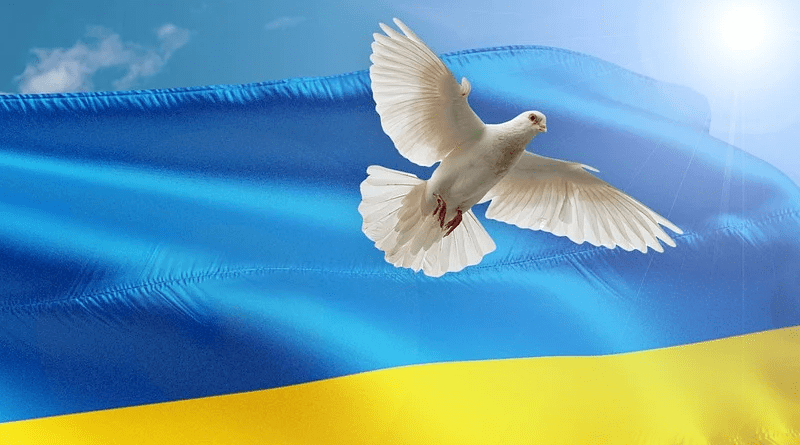Can Swiss Initiative Open The Door For Peace In Ukraine? – OpEd
By Arab News
By Yasar Yakis
An international conference on the Ukrainian question is scheduled to be held on June 15-16 in the resort of Burgenstock in Switzerland. This country has a tradition of mediating in complicated processes. Therefore, the summit stands a chance of success. The idea is to work out a framework for a comprehensive and lasting peace regarding the situation in Ukraine.
Russia has announced that it will not participate in the meeting because it believes that Switzerland has relinquished its neutrality in the conflict.
China previously conducted a similar initiative by issuing a 12-point plan for the solution of the Ukrainian problem, but without entering into specifics. Russia displayed a lukewarm attitude to the Chinese initiative but did not discard it entirely.
China has now said that, if the Burgenstock meeting materializes, it might consider participating in it. This will be the first serious attempt to find a solution to this complicated problem.
Swiss President Viola Amherd did not promise the moon but said that it was worth trying.
As the Ukraine crisis has unfolded, some transatlantic community countries have grown skeptical about whether NATO will be able to militarily sustain Kyiv for a prolonged period. Such misgivings have also been voiced in certain quarters in the US, with some having lost their appetite for getting deeply involved in the Ukraine war.
Presidential candidate Donald Trump says that he could bring the Ukrainian crisis to an end within 24 hours. He believes that both Russian President Vladimir Putin and Ukrainian President Volodymyr Zelensky have strengths and weaknesses. He probably believes that Ukraine might settle for an arrangement that will give Russia the territories that it already occupies. Zelensky will, of course, strongly oppose such a solution, especially in light of the present US administration’s policy of prolonging the war to weaken Russia.
There are differences between President Joe Biden’s approach to the Ukrainian crisis and that of Trump. The present US administration believes that a joint NATO mission may be set up in Ukraine. It will not aim at declaring war on Russia but will try to improve Kyiv’s military capabilities in terms of planning, training and fighting.
Turkiye has intricate relations with both Russia and Ukraine. Turkish President Recep Tayyip Erdogan maintains fair relations with Putin. He also maintains good relations with Zelensky. This combination allows Ankara to remain neutral in the Russia-Ukraine conflict, although the risks of it getting out of control are also real.
Relations between Turkiye and Ukraine have followed a stable course since the dismemberment of the Soviet Union. A few weeks before the outbreak of the Ukrainian war in February 2022, Ankara and Kyiv signed a deal to allow Ukrainian factories to manufacture Turkish drones and, as this was a commercial deal, Russia did not oppose it. This arrangement is still valid and Moscow does not make it a problem with Turkiye. The deal is now bearing fruit. NATO Secretary-General Jens Stoltenberg referred to this project as an example of how NATO allies were supporting Ukraine and increasing this country’s capacity to manufacture its own weapons. Hopefully, this will not drag Turkiye into a conflict with Russia.
US Secretary of State Antony Blinken also seems deeply committed to making Ukraine a member of NATO sooner or later. He said that a roadmap had to be drawn up as soon as possible to that effect.
The election of a new secretary-general for NATO is another issue that keeps the alliance busy. This time we have been lucky enough to produce several candidates. Stoltenberg, whose term expires on Oct. 1, is the second longest-serving NATO secretary-general after Joseph Luns. Dutch Prime Minister Mark Rutte is one of the new candidates. He is supported by the US, UK and Germany. Romanian President Klaus Iohannis and Estonian Prime Minister Kaja Kallas are also in the running. As the secretary-general is elected by consensus, a compromise has to be worked out.
Turkish Foreign Minister Hakan Fidan insisted that whoever becomes secretary-general has to “fully and unconditionally support Turkiye in its fight against terror.” Ankara may try to obtain as firm a promise as possible on this critical issue, but the US will probably again attempt to distinguish between the Kurdish fighters in Syria and the PKK terror organization.
NATO’s expansion toward Asia-Pacific is another major concern in the alliance. China is the biggest challenge for the US. If reelected, the Trump administration will probably give priority to the Pacific Rim. The US has initiated in the Pacific area a loose cooperation framework known as the Quad, which includes the US, Australia, India and Japan. It is a loose gathering with no binding mechanisms.
AUKUS is another pact and it brings together Australia, the UK and the US. It aims to contribute to the military presence of the West in the Pacific area. These cooperation mechanisms contribute to the militarization of Japan and South Korea.
The US wanted NATO to open a liaison office in Tokyo that would cover the alliance’s relations with Japan and South Korea, but France blocked this initiative.
It is contested whether a minuscule group of Hawaiian islands in the middle of the Pacific Ocean should be considered part of the North Atlantic alliance just because it is part of the US’ territory. If an armed conflict erupted in Hawaii, very few NATO countries outside of the US would be eager to send troops to this archipelago.
The Swiss initiative is the best available option for peace in Ukraine. If it works, some progress may be expected; if not, we will stay where we are.
- Yasar Yakis is a former foreign minister of Turkiye and founding member of the ruling AK Party. X: @yakis_yasar

